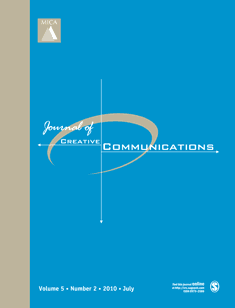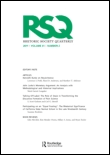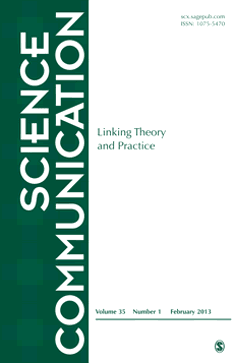
Environmental Communication-A Journal of Nature and Culture
Scope & Guideline
Transforming Perspectives through Environmental Communication
Introduction
Aims and Scopes
- Interdisciplinary Approaches to Environmental Communication:
The journal embraces a range of methodologies, integrating insights from communication studies, environmental sciences, cultural studies, and social sciences to address complex environmental issues. - Cultural Narratives and Environmental Identity:
Exploring how cultural narratives shape environmental identities and activism, the journal emphasizes the role of storytelling and personal experiences in fostering ecological awareness. - Impact of Media on Environmental Understanding:
The journal investigates the influence of various media forms—including traditional media, social media, and emerging technologies—on public understanding of environmental issues and climate change. - Engagement and Mobilization Strategies:
Research published in the journal focuses on strategies for engaging communities and mobilizing action for environmental advocacy, emphasizing the role of effective communication in fostering collective action. - Critical Examination of Environmental Discourse:
The journal critically analyzes the framing of environmental issues in public discourse, assessing how language, narratives, and representations shape perceptions and policy responses.
Trending and Emerging
- Digital and Social Media Activism:
There is a growing focus on the role of digital and social media in environmental activism, particularly how platforms like Instagram and TikTok are utilized for climate communication and mobilization. - Narratives of Care and Community Engagement:
Research emphasizing care ethics and community-based approaches to environmental issues is gaining prominence, highlighting the importance of local narratives and collective action in fostering environmental stewardship. - Climate Justice and Equity in Communication:
An increasing number of studies are addressing climate justice, focusing on how communication practices can promote equity and representation for marginalized communities in environmental discourse. - Innovative Communication Technologies:
Emerging themes include the use of innovative technologies such as virtual reality and gamification in promoting pro-environmental behaviors, reflecting a trend toward interactive and immersive communication strategies. - Intersections of Identity and Environmentalism:
There is a rising interest in exploring how identity factors, including gender, ethnicity, and socio-economic status, influence environmental attitudes and engagement, fostering a more inclusive discourse.
Declining or Waning
- Traditional Environmental Journalism:
There appears to be a declining emphasis on conventional environmental journalism, as the focus shifts toward participatory and digital forms of communication that engage audiences in different ways. - Technical Risk Communication:
The once strong emphasis on purely technical risk communication strategies is diminishing, with a growing preference for narrative-driven and emotionally resonant approaches that connect with audiences on a personal level. - Overly Simplistic Environmental Messaging:
Research focusing on simplistic environmental messaging is less prevalent, as scholars increasingly recognize the need for nuanced and contextually rich communication that addresses the complexities of environmental issues. - Focus on Polarization in Environmental Discourse:
While polarization remains a topic of interest, the number of studies exclusively dedicated to this theme has decreased, as researchers are exploring broader frameworks that encompass collaboration and consensus-building. - Historical Perspectives on Environmental Issues:
There is a noticeable decline in studies that focus exclusively on historical perspectives of environmental communication, as recent research tends to favor contemporary issues and forward-looking approaches.
Similar Journals

Doxa Comunicacion
Fostering innovative dialogue in communication studies.Doxa Comunicación is a prominent open-access journal dedicated to advancing the field of communication studies, published by Universidad San Pablo CEU, under the Faculty of Humanities and Communication Sciences. Established in 2003, this journal has gained recognition for its commitment to disseminating high-quality research and thought-provoking articles, fostering a vibrant academic community. With an ISSN of 1696-019X and an E-ISSN of 2386-3978, Doxa Comunicación occupies a vital niche in the academic landscape of Spain, contributing to both national and international discourses. In the 2023 rankings, it is categorized in the Q3 quartile within the fields of Communication and Social Sciences (miscellaneous), reflecting its competitive standing among peer publications. The journal's diverse scope, including contemporary communication theories and practices, ensures relevance for researchers, professionals, and students alike. With a Scopus rank of #333 in Social Sciences (miscellaneous) and #291 in Communication, Doxa Comunicación serves as an essential platform for innovative research that addresses the complex challenges of modern communication in a rapidly evolving society.

IC-Revista Cientifica de Informacion y Comunicacion
Pioneering Insights in Communication and Cultural StudiesIC-Revista Cientifica de Informacion y Comunicacion, published by UNIV SEVILLA, EDITORIAL, stands at the forefront of academic discourse in the fields of Communication, Cultural Studies, Library and Information Sciences, and Linguistics and Language. With its ISSN 1696-2508 and E-ISSN 2173-1071, this esteemed journal showcases high-quality research, contributing significantly to the advancement of knowledge since its inception in 2016. The journal is recognized for its rigorous standards, holding a Q2 category in Communication, a Q1 category in Cultural Studies, as well as Q2 rankings in both Library and Information Sciences and Linguistics and Language as of 2023. With a growing reputation, it is ranked in the mid percentiles across various Scopus categories, marking it as a key player in its spheres of influence. Although not an open-access journal, it remains accessible through institutional subscriptions, making it a vital resource for scholars and practitioners alike. The editorial team is dedicated to fostering innovation and engagement within the academic community, aligning with the evolving dynamics of information and communication.

Plaridel
Uplifting Voices, Bridging Discourses.Plaridel is an esteemed academic journal dedicated to the field of communication, published by the University of the Philippines Diliman. With the ISSN 1656-2534, this journal embraces a significant role in fostering scholarly dialogue and advancing research within the rapidly evolving landscape of communication studies. As one of the platforms in the Philippines, it aims to uplift local and international discourse by featuring innovative research, critical reviews, and theoretical explorations relevant to various facets of communication. Although currently rated in the Q4 quartile for 2023 in the Communication category, Plaridel's commitment to quality and scholarly rigor reflects a promising trajectory for future impact. The journal has been operational since 2018 and welcomes a wide array of contributions, especially from emerging scholars. Open access provides greater accessibility to researchers and enthusiasts, promoting broader engagement with the journal’s content. Plaridel holds an important place within the academic community, aspiring to elevate standards of communication research and practice in the Philippines and beyond.

Journal of Creative Communications
Elevating Conversations through Creative InquiryThe Journal of Creative Communications, published by SAGE PUBLICATIONS INC, stands as a prominent forum within the field of communication, holding a Q2 rank in the Communication category according to the 2023 metrics. With an ISSN of 0973-2586 and an E-ISSN of 0973-2594, this journal offers a comprehensive exploration of inventive communication practices, theories, and methodologies, making it a vital resource for researchers, professionals, and students alike. Since its inception in 2006, the journal has been committed to fostering innovative discourse and scholarly excellence, as evidenced by its Scopus ranking at #157 of 511 in Social Sciences – Communication, placing it in the 69th percentile. While the journal does not currently offer open access options, it continues to maintain a high impact factor through rigorously peer-reviewed contributions. As it converges towards 2024, the Journal of Creative Communications seeks to elevate the discourse surrounding contemporary communication issues, pushing the boundaries of creativity and inquiry in an ever-evolving landscape.

Communication & Society-Spain
Empowering Scholars to Shape the Future of CommunicationCommunication & Society-Spain, published by Universidad de Navarra, is an esteemed open access journal dedicated to advancing scholarship in the dynamic fields of communication and cultural studies. Since its inception in 1988, the journal has maintained a commitment to disseminating high-quality research that engages with contemporary issues and contributes to the evolving discourse around communication theories and practices. With a commendable Q1 ranking in both Communication and Cultural Studies categories, it stands as a prominent source for researchers and professionals alike, reflecting its robust presence in the academic community—evidenced by its Scopus rankings placing it in the top percentiles within both fields. The journal's scope encompasses diverse perspectives and methodologies, thereby fostering interdisciplinary dialogue essential for understanding the complexities of communication in society. With a publication history that spans from 2010 to 2024 and a ranking of #87 out of 1304 in Cultural Studies, our commitment to open access ensures that impactful research is readily available to all, promoting further scholarly engagement and innovation.

Rhetoric Society Quarterly
Championing Rigorous Inquiry in Rhetoric and Language.Rhetoric Society Quarterly, ISSN 0277-3945, is a distinguished academic journal published by Routledge Journals, Taylor & Francis Ltd, based in the United Kingdom. Since its inception in 1976, the journal has become a vital platform for scholarly discourse in the fields of Communication and Linguistics and Language, showcasing research that examines the complexities of rhetoric across various contexts. Currently enjoying a Q2 ranking in Communication and an impressive Q1 ranking in Linguistics and Language, it is recognized for its rigorous peer-review process and commitment to quality. With an H-index reflective of its scholarly influence and reaching across generations of research leading up to 2024, the journal continues to be a crucial resource for researchers, educators, and practitioners. Although it does not currently offer open access options, readers can expect high-quality, impactful articles that contribute significantly to their fields. Explore the rich tradition of rhetorical scholarship and engage with a community dedicated to advancing knowledge and practice within this ever-evolving domain.

Tripodos
Exploring the Dynamics of CommunicationTripodos is a prominent open-access journal published by UNIV RAMON LLULL, FAC CIENCIES COMUNICACIO BLANQUERNA in Spain, dedicated to advancing the field of communication studies since its establishment. With an ISSN of 1138-3305 and an E-ISSN of 2340-5007, Tripodos has gained recognition for publishing high-quality research articles that examine diverse aspects of communication in contemporary society. The journal has successfully transitioned to open access since 2006, ensuring that its valuable contributions are readily available to a global audience. As of 2023, Tripodos holds a Q3 ranking in the Communication category according to Scopus, reflecting its growing influence within the academic community, ranking 187 out of 511 journals and positioning itself in the 63rd percentile. This journal serves as an essential platform for researchers, professionals, and students who are eager to explore the dynamic field of communication and its impact on society.

Canadian Journal of Communication
Exploring the Frontiers of Human InteractionCanadian Journal of Communication, published by University of Toronto Press Inc., serves as a vital conduit for scholarly discourse within the field of communication studies. With an ISSN of 0705-3657 and an E-ISSN of 1499-6642, this esteemed journal holds a Q2 ranking in the category of Communication according to 2023 metrics, reflecting its commitment to high-quality research and innovation. Located in Canada and covering converged years from 2016 to 2024, the journal provides a comprehensive platform for the exchange of ideas, critical analyses, and theoretical advancements that shape our understanding of communication in contemporary society. Although it does not currently offer open access, the journal’s influence is demonstrated by its position in Scopus, ranking #332 out of 511 in the Social Sciences Communication category. This publication is essential for researchers, professionals, and students seeking to deepen their knowledge in communication contexts and explore the intricate dynamics that define human interaction.

Historia y Comunicacion Social
Fostering Innovative Dialogues Through Time.Historia y Comunicación Social is a distinguished academic journal published by UNIVERSIDAD COMPLUTENSE MADRID, SERVICIO PUBLICACIONES, dedicated to the interdisciplinary exploration of history and communication. With a notable impact factor reflected in its impressive rankings across various categories—Q1 in History and Q2 in Communication and Sociology/Political Science—this journal stands out as a critical resource for scholars and practitioners alike. Established as an Open Access platform since 1996, it has broadened accessibility to research, fostering innovative discussions and insights from the historical and communicative realms. Spanning from 2010 to 2024, the journal encourages contributions that challenge conventional narratives and offer fresh perspectives. With its significant recognition in Scopus rankings, inclusive of a remarkable 88th percentile in Arts and Humanities History, Historia y Comunicación Social serves as a vital hub for those seeking to deepen their understanding of the complex interplay between history and communication.

SCIENCE COMMUNICATION
Advancing the Dialogue Between Science and SocietySCIENCE COMMUNICATION is a premier journal that has established itself as a vital platform for the exploration of the intersection between science, society, and communication practices. Published by SAGE Publications Inc, this journal boasts a commendable impact within the field, evidenced by its 2023 ranking as Q1 in Sociology and Political Science, placing it in the top percentile of its category. With an impressive Scopus rank of 14 out of 1466 in the social sciences domain, it serves as an essential resource for researchers, professionals, and students dedicated to understanding how scientific information is communicated and perceived across various platforms and audiences. Spanning a rich publication history from 1979 to 2024, SCIENCE COMMUNICATION publishes original research, case studies, and reviews that contribute to the development of effective communication strategies in science. Although the journal does not currently offer open access options, its content remains pivotal for fostering informed discourse within academia and beyond. Engaging with this journal is invaluable for anyone interested in enhancing science literacy and engagement in contemporary issues.